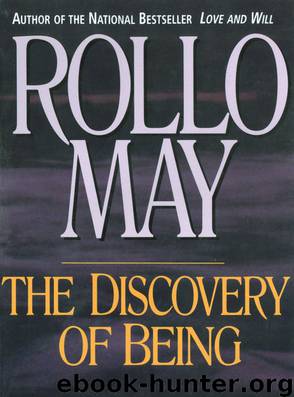The Discovery of Being: Writings in Existential Psychology by May Rollo

Author:May, Rollo [May, Rollo]
Language: eng
Format: epub
Publisher: W. W. Norton & Company
Published: 1994-12-17T00:00:00+00:00
SEVEN
Anxiety and Guilt as Ontological
OUR DISCUSSION of being and nonbeing now leads to the point where we can understand the fundamental nature of anxiety. Anxiety is not an affect among other affects, such as pleasure or sadness. It is rather an ontological characteristic of man, rooted in his very existence as such. It is not a peripheral threat which I can take or leave, for example, or a reaction which may be classified beside other reactions; it is always a threat to the foundation, the center of my existence. Anxiety is the experience of the threat of imminent nonbeing.1
In his classical contributions to the understanding of anxiety, Kurt Goldstein has emphasized that anxiety is not something we “have” but something we “are.” His vivid descriptions of anxiety at the onset of psychosis, when the patient is literally experiencing the threat of dissolution of the self, make his point abundantly clear. But, as he himself insists, this threat of dissolution of the self is not merely something confined to psychotics but describes the neurotic and normal nature of anxiety as well. Anxiety is the subjective state of the individual’s becoming aware that his existence can become destroyed, that he can lose himself and his world, that he can become “nothing.”2
This understanding of anxiety as ontological illuminates the difference between anxiety and fear. The distinction is not one of degree nor of the intensity of the experience. The anxiety a person feels when someone he respects passes him on the street without speaking, for example, is not as intense as the fear he experiences when the dentist seizes the drill to attack a sensitive tooth. But the gnawing threat of the slight on the street may hound him all day long and torment his dreams at night, whereas the feeling of fear, though it was quantitatively greater, is gone for the time being as soon as he steps out of the dentist’s chair. The difference is that the anxiety strikes at the central core of his self-esteem and his sense of value as a self, which is the most important aspect of his experience of himself as a being. Fear, in contrast, is a threat to the periphery of his existence; it can be objectivated, and the person can stand outside and look at it. In greater or lesser degree, anxiety overwhelms the person’s discovery of being, blots out the sense of time, dulls the memory of the past, and erases the future3—which is perhaps the most compelling proof of the fact that it attacks the center of one’s being. While we are subject to anxiety, we are to that extent unable to conceive in imagination how existence would be “outside” the anxiety. This is why anxiety is so hard to bear, and why people will choose, if they have the chance, severe physical pain which would appear to the outside observer much worse. Anxiety is ontological, fear is not. Fear can be studied as an affect among other affects, a reaction among other reactions.
Download
This site does not store any files on its server. We only index and link to content provided by other sites. Please contact the content providers to delete copyright contents if any and email us, we'll remove relevant links or contents immediately.
Rewire Your Anxious Brain by Catherine M. Pittman(17613)
Talking to Strangers by Malcolm Gladwell(11941)
The Art of Thinking Clearly by Rolf Dobelli(8892)
Mindhunter: Inside the FBI's Elite Serial Crime Unit by John E. Douglas & Mark Olshaker(7871)
Becoming Supernatural by Dr. Joe Dispenza(7138)
Change Your Questions, Change Your Life by Marilee Adams(6682)
The Road Less Traveled by M. Scott Peck(6669)
Nudge - Improving Decisions about Health, Wealth, and Happiness by Thaler Sunstein(6658)
The Lost Art of Listening by Michael P. Nichols(6505)
Enlightenment Now: The Case for Reason, Science, Humanism, and Progress by Steven Pinker(6430)
Win Bigly by Scott Adams(6339)
Mastermind: How to Think Like Sherlock Holmes by Maria Konnikova(6271)
The Way of Zen by Alan W. Watts(5825)
Daring Greatly by Brene Brown(5678)
Grit by Angela Duckworth(4759)
Big Magic: Creative Living Beyond Fear by Elizabeth Gilbert(4755)
Men In Love by Nancy Friday(4363)
Flow by Mihaly Csikszentmihalyi(4078)
The Four Tendencies by Gretchen Rubin(4042)
